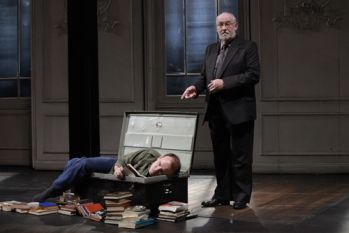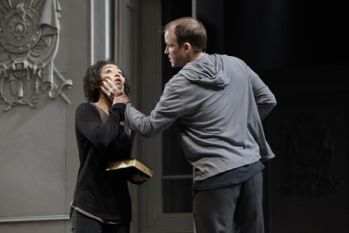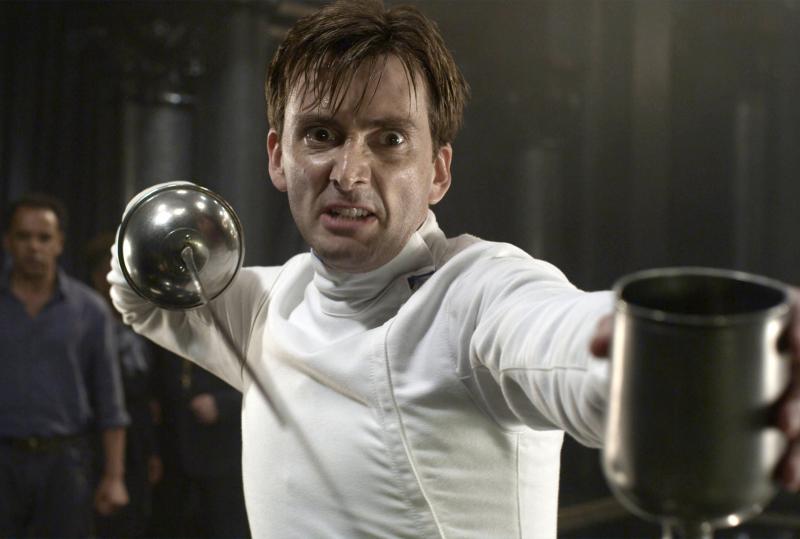The National Theatre’s new production of Hamlet is both a very good Hamlet, yet also a somehow disappointing one. For a work so rich in possibilities, with so much emotion, so much superb and intricate engineering, it is often like this, in England or anywhere else - inspiring and unconvincing at once.
Of few works in drama can this be said, or, as it were, permitted. For Hamlet, every allowance can and should be made. The most galvanising one I’ve seen also happened to be at the National (in the Lyttelton), 23 years ago: in Ingmar Bergman’s guest Swedish-language staging, Hamlet was a punk - in the broadest sense of the word - who, among other disgusting foibles, gobbed straight down Ophelia’s throat when telling her, basically, to fuck off to a nunnery.
Such moments enflamed, aesthetically, daringly, refreshingly, a play which, in the original 20 or 30 years ago, seemed rarely to be got right (Richard Eyre’s 1980 production with Jonathan Pryce was a famous exception). There have of course been some stand-out Hamlets in much more recent years, with, amongst others, Simon Russell Beale, David Tennant and Jude Law.
 Nicholas Hytner’s staging with Rory Kinnear in the main role, which premiered at the Olivier last night, reminded me a bit of Bergman’s. It’s modern, militaristic and unfussy. Several times (but not always) it also reminded me why it is one of earth’s greatest plays. One moment sticks out. In the bedchamber scene between the Prince and his mother Gertrude (Clare Higgins) after the concealed Polonius (David Calder, pictured above with Kinnear - with terrible laryngitis on press night) has been stabbed, Hamlet’s father’s ghost reappears to tell the conflicted avenger of his “almost blunted purpose” - to kill Claudius.
Nicholas Hytner’s staging with Rory Kinnear in the main role, which premiered at the Olivier last night, reminded me a bit of Bergman’s. It’s modern, militaristic and unfussy. Several times (but not always) it also reminded me why it is one of earth’s greatest plays. One moment sticks out. In the bedchamber scene between the Prince and his mother Gertrude (Clare Higgins) after the concealed Polonius (David Calder, pictured above with Kinnear - with terrible laryngitis on press night) has been stabbed, Hamlet’s father’s ghost reappears to tell the conflicted avenger of his “almost blunted purpose” - to kill Claudius.
In this relentlessly secular, actually over-politicised version, so apparently ridiculous an effect nonetheless works perfectly. James Laurenson’s unostentatious Ghost, affectingly and rightly human and convincing in the crucial battlements scene at the start, returns here to remind us - and Hamlet - what the play is about: belief and disbelief, honour and treachery, loyalty and betrayal, seeing and not seeing.
It’s all summed up in this scene and is done so, pithily, in the Olivier. Hamlet is appalled at his confusion. Gertrude, to whom the Ghost is invisible, tramples over a portrait of Claudius, the Ghost’s brother, which Hamlet, outraged, has just thrown from a wall. Its place is now occupied by the Ghost. He’s imploring the protagonist to kill the man, his brother, who’s murdered him and married his wife; the prince then spends the last minutes of this extraordinary scene begging his mother, in the most lubricious of terms, not to sleep with his hated new stepfather.
The suggestion that Ophelia is murdered by a couple of Claudius’s spooks is probably a step too far
It gets no better than this and Hytner perfectly understands it. This is mainly a lucid, brilliantly designed reading of Hamlet, which finds the sick humour of the thing without, quite, debasing its moral complexity. Claudius’s usurping court is a dictator’s one from about now, the set a clean oblong hemmed in by three walls adorned with an imperial coat of arms, populated variously by desks, sofas, smart dining chairs - and security men talking into their lower arms.
It works. Patrick Malahide’s Claudius, with his ice-breaking blade of a voice, is a dead ringer for Vladimir Putin. Even if it isn’t meant to be him, the whole mise-en-scène, with entourage, pristine suits, guns hidden and sometimes not so hidden, is simply Putinesque: Elsinore governed by intimidating laws of surveillance and constant threats of physical abuse, and worse.
 Kinnear isn’t a romantic Prince, but an unsettled, battling one, who painfully sees what he has to do yet who cannot act and hates himself for it. “To be or not to be” is recited as urgent self-inquisition, a natural extension of - a pursuit of deepening ideas after - the previous “rogue and peasant slave” soliloquy (at the end of which, curiously, there was applause). His is a very deliberate Hamlet, whose antic disposition - costumed in gym clothes - is manifestly put on to torment Polonius and, because he puts her in the same spying camp as her father and Claudius, destroy Ophelia (Ruth Negga, pictured above with Kinnear).
Kinnear isn’t a romantic Prince, but an unsettled, battling one, who painfully sees what he has to do yet who cannot act and hates himself for it. “To be or not to be” is recited as urgent self-inquisition, a natural extension of - a pursuit of deepening ideas after - the previous “rogue and peasant slave” soliloquy (at the end of which, curiously, there was applause). His is a very deliberate Hamlet, whose antic disposition - costumed in gym clothes - is manifestly put on to torment Polonius and, because he puts her in the same spying camp as her father and Claudius, destroy Ophelia (Ruth Negga, pictured above with Kinnear).
She becomes the most afflicted, cruelly isolated figure in this production, a gamine slip of a thing whose real madness sends her careering around stage with rubbish-laden supermarket trolleys and underlines Hamlet’s as the cleverly manipulative ploy it is. The suggestion that she’s murdered by a couple of Claudius’s spooks is probably a step too far, as is the top-heavy idea of Laertes (Alex Lanipekun), who left Elsinore as a poor student, returning with an avenging army of gun-toting insurgents.
If there’s something missing in Hytner’s production, it’s that sense of the personal; the dreadful truth that, amidst all the plotting and politicking, rolled out here with stylish panache, these characters are maiming themselves and each other in a violently dysfunctional family feud. This is certainly caught in the devastation of Ophelia, and Higgins’s Gertrude does seem, in the above-mentioned Ghost scene, to experience some horror at her essential corruption. That’s where it stops.
That we’re left finally unmoved (I was) must stem from Kinnear not quite having the emotional range to suggest a severe psycho-philosophical crack-up, though it would be wrong to assess his performance as anything less than commanding. He just isn’t quite charismatic, or tormented, enough; and Hytner’s many loud production ideas - a crashing jet flies over at the start and at the end - blunt the tragedy. This isn’t exemplary or even especially illuminating Shakespeare. But it is a thoroughly enjoyable evening.
GREAT DANES
Alan Mahon, Tobacco Factory, Bristol. Hamlet as wayward teen spirit
Andrius Mamontovas, Globe to Globe. Lithuanian take on the Danish play puts on a frantic disposition
Benedict Cumberbatch, Barbican. Visuals threaten to swamp Shakespeare – and, yes, Sherlock
 David Tennant, RSC/BBC. Star looks for life in an infinite space beyond the Tardis
David Tennant, RSC/BBC. Star looks for life in an infinite space beyond the Tardis
Lars Eidinger, Schaubühne Berlin. Acrobatic Hamlet, outshone by the earth and the rain
Maxine Peake, Royal Exchange, Manchester. An underwhelming production, but Peake is gripping as the young Prince
Michael Sheen, Young Vic. Sheen is riveting as the crazed Danish Prince in Ian Rickson's terrifying psychiatric-hospital staging
Andrew Scott, Almeida Predictably unpredictable performance subject to Robert Icke's slow-burn clarity















Add comment